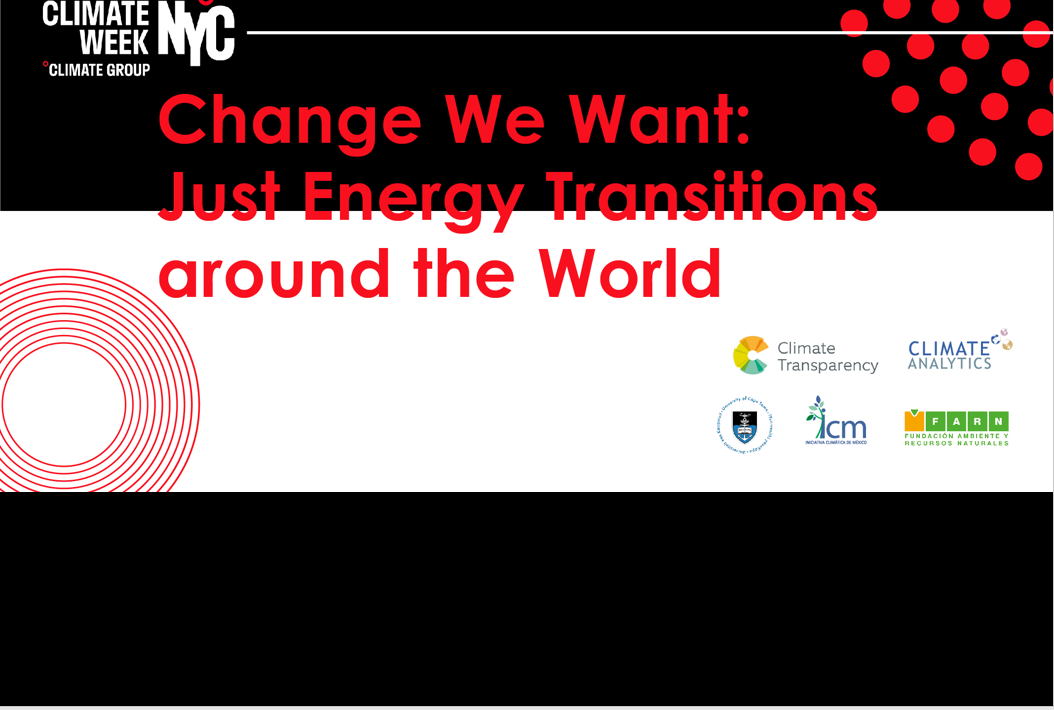The consequences of the climate emergency are becoming more and more visible worldwide with floods, extreme heat waves and unusual droughts, compromising global and local efforts to combat poverty, achieve food security and eliminate inequality. Some countries from the Global South are transitioning their energy systems in the face of the growing urgency to limit the increase in global temperature to 1.5 ° C. However, others are still dependent on fossil fuels.
To increase the peer exchange and learning between countries in a South-South context, as part of the Climate Week NYC dialogues, Climate Transparency, Climate Analytics, Iniciativa Climática de México, University of Cape Town, and Fundación Ambiente y Recursos Naturales (FARN) hold the online event on 23 September entitled: “Change We Want: Just Energy Transitions around the World“.
The event presented the latest findings on socio-economic aspects of energy transitions in Antigua and Barbuda, Argentina, Mexico and South Africa. The experts emphasized the urgency of accelerating the energy transition. But, the discussion cannot be limited to economic and technological considerations; the energy transition and the formulation of ambitious climate policies must consider each country’s social and economic context and recognize that many transitions are necessary.
“We must stop business as usual and work towards mitigation, adaptation and increase resilience to the changes we are already seeing. We still rely on fossil fuels for our energy needs, and it is not what we need. We need to stop calling renewables “alternative energies”. They are the source of energy for today and the future”, remarked Robert Brecha from Climate Analytics.
Ambassador Diann Black-Layne highlighted that in smaller countries like Antigua and Barbuda “the only energy option is fossil fuel-based energy, a powerful monopoly we must resist despite the political risks. Therefore, we need transitions at the national level and the regional and international spheres. Still, we must guarantee that the huge amount of benefits (new entrepreneurs, businesses and jobs) stay in our territory “.
Mauro Fernández from FARN pointed out that, similarly, in Rio Turbio (a coal town of Argentina), “people do not see any other potential opportunity as mining is a strong identity. Despite the climate targets, the energy transition is envisioned as something to be discussed in 30 years. However, other transitions such as feminism are questioning fossil masculinities”.
South Africa has made significant progress on the institutional arrangements to promote a just transition as part of national development planning. Also, civil society has contributed to placing just transition at the centre of the public debate. However, the government still needs to scale up implementation, address the challenges of an indebted utility, and promote economic diversification in the coal regions: “Despite coal generation is not growing, there are no new employments for the new generations, and there are significant forced job losses”, mentioned Jesse Burton from the Energy Systems Research Group at the University of Cape Town.
In Mexico, it is necessary to consider the socio-spatial dimension in energy planning and prevent the conflicts that arise from energy projects. Renewable energies like photovoltaic solar energy are a sustainable option to eradicate energy poverty in Mexico and address climate emergencies. “However, Mexico is taking a step back in just transition as the federal government has prioritized a fossil fuel-based energy policy. To be on a 1.5°C emissions trajectory, Mexico needs to reduce its emissions, largely increase solar and wind and completely get rid of coal, diesel and fuel oil”, remarked Ana Tamborrel from ICM.
“We could have different scales of projects and property schemes in Mexico, so not all need to be private; things can be developed differently and guarantee that local communities become allies, not only the beneficiaries, and empower them”, commented the Mexican expert. Mauro Fernández from Argentina mentioned that “many factors need to transition. We all need to deconstruct, and feminism has played an important role to question coal mining”.
In the case of Antigua and Barbuda, Ambassador Black-Layne pointed out that “most young men look forward to implementing renewable energies; male farmers are happy to have solar panels. However, there is still a lot of misinformation”. In South Africa, as highlighted by Jesse Burton ESKOM, the energy transition office, which used to be the best utility globally, now aims to achieve several ambitious targets as there is more understanding about the survival of the projects and the global context of the projects.
The event has gathered almost 50 participants representing different countries and has been concluded by a questions and answer sessions, during which similarities and differences among countries as well as needed actions have been discussed.







